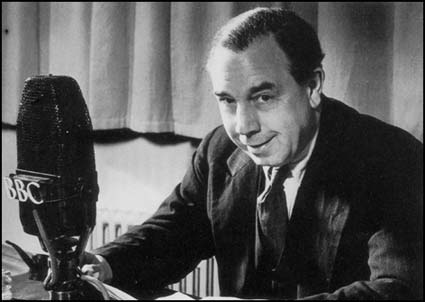In today’s Wall Street Journal drama column I report from Chicago on a rare American revival of J.B. Priestley’s An Inspector Calls. Here’s an excerpt.
* * *
If you know who J.B. Priestley was, you’re probably British. His middlebrow novels never caught on over here, but two of them, “The Good Companions” and “Angel Pavement,” sold by the truckload in his native land, and his plays are now revived there with fast-growing frequency. One of them, “An Inspector Calls,” made it to Broadway twice, in 1947 and 1994, and the second of those productions ran for 454 performances. Since then, though, Mr. Priestley, who died in 1984, has dropped completely off the screen of American renown, and Remy Bumppo Theatre Company’s production of “An Inspector Calls” appears to be the play’s first U.S. revival in 19 years.
 What of it? Well, Remy Bumppo is one of Chicago’s most interesting theater troupes, and “An Inspector Calls,” in which Mr. Priestley used an old-fashioned drawing-room detective story as a vehicle for his socialist sermonizing, regularly pops up in discussions of what chroniclers of the period refer to as “Austerity Britain.” It is, one gathers, a key document in the cultural history of postwar England, and most of today’s British drama critics also believe it to be a play of quality.
What of it? Well, Remy Bumppo is one of Chicago’s most interesting theater troupes, and “An Inspector Calls,” in which Mr. Priestley used an old-fashioned drawing-room detective story as a vehicle for his socialist sermonizing, regularly pops up in discussions of what chroniclers of the period refer to as “Austerity Britain.” It is, one gathers, a key document in the cultural history of postwar England, and most of today’s British drama critics also believe it to be a play of quality.
For all these reasons, I decided to fly out to Chicago to see what I’d been missing, and I’m glad I did. To be sure, “An Inspector Calls” is nothing remotely like a great play, but it turns out to be a fascinating period piece that is highly effective when placed in the hands of a strong cast…
Set in 1912, “An Inspector Calls” unfolds in the dining room of the Birlings, a Yorkshire family whose patriarch (Roderick Peeples) is an upwardly mobile businessman who is about to marry off his daughter (Isabel Ellison) to a nobleman (Greg Matthew Anderson). Sheila Birling and her fiancé are being toasted when a police inspector (Nick Sandys) knocks on the door, announces that he is investigating the suicide of a poor young woman of the town and starts asking awkward questions. It soon emerges that everyone in the room knew the girl–two of them intimately–and had something to do with her death.
But “An Inspector Calls” isn’t a whodunit, at least not of the ordinary sort. It’s more like a cross between “The Mousetrap” and “Waiting for Lefty,” a socialist tract in which the mysterious Inspector Goole (whose last name is more significant than is immediately apparent) endeavors to persuade each member of the family of his or her social responsibility, culminating in a fire-breathing speech delivered from center stage (yes, it’s in the script) in which he warns them that “if men will not learn that lesson, then they will be taught it in fire and blood and anguish.”
“An Inspector Calls” contains a fair amount of that sort of speechmaking, the effect of which is not unlike having dull spikes hammered into your head. But whenever Mr. Priestley climbs down from his soapbox and attends to his responsibilities as a storyteller–which is most of the time–he succeeds in turning what could easily have been a droning exercise in finger-pointing into a soundly made play….
* * *
Read the whole thing here.
The trailer for An Inspector Calls:
Terry Teachout on the arts in New York City
An ArtsJournal Blog
